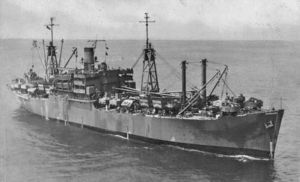USS Alamance (AKA-75)
 Tolland class AKA, similar to USS Alamance Tolland class AKA, similar to USS Alamance | |
| History | |
|---|---|
| Laid down: | 15 September 1944 |
| Launched: | 11 November 1944 |
| Commissioned: | 22 December 1944 |
| Decommissioned: | 25 June 1946 |
| Struck: | 19 July 1946 |
| Fate: | Unknown |
| General Characteristics | |
| Hull Type: | C2-S-AJ3 |
| Displacement: | 8,635 tons light, 13,910 tons loaded |
| Length: | 459 ft 2 in (140 m) |
| Beam: | 63 ft (19.2 m) |
| Draft: | 26 ft 4 in (8.0 m) |
| Propulsion: | GE geared steam turbine drive, single propeller, 6,000 shp (4.5 MW) |
| Speed: | 16.5 knots (30.6 km/h) |
| Complement: | 395 (62 officers, 333 men), plus embarked troops |
| Armament: | 1 × 5"/38 caliber DP gun, 4 × twin 40 mm AA guns, 16 × 20 mm AA guns |
| Boats: | 14 LCVP, 8 LCM |
| NOTES: Some sources report different displacements for ships of this type. Speed and complement may have changed as the ship or her mission were modified. Often one or two LCVPs were replaced by LCPLs. 20mm AA guns were sometimes removed. | |
USS Alamance (AKA-75) was a Tolland class attack cargo ship named after Alamance County, North Carolina. Like all AKAs, Alamance was designed to carry military cargo and landing craft, and to use the latter to land weapons, supplies, and troops on enemy shores during amphibious operations. She served as a commissioned ship for 18 months from 1944-1946.
History
Alamance was laid down under a Maritime Commission contract (MC hull 1405) on 15 September 1944 at Wilmington, North Carolina, by the North Carolina Shipbuilding Co.; launched on 11 November 1944; sponsored by Mrs. Carl T. Durham; acquired by the Navy on 22 December 1944; and placed in commission on that same day, CDR Otto John Stein in command.
Following shakedown in the Chesapeake Bay area, the attack cargo ship got underway for the Pacific theater on 12 February 1945. She transited the Panama Canal on the 18th and proceeded to Pearl Harbor. Upon arriving there, the vessel reported to Transport Division 65 for duty. During the remainder of World War II, Alamance shuttled cargo and personnel from Pearl Harbor to ports in the Philippines, Eniwetok, Saipan, Palau Islands, and Ulithi.
During the last month of the war, the ship operated out of Pearl Harbor on amphibious training exercises. On 1 September, she sailed for the Northern Mariana Islands where she joined a convoy transporting occupation forces to Japan. She arrived at Sasebo on the 22d and discharged personnel and equipment of the 5th Marine Division. She then steamed on to Lingayen Gulf to load more troops.
Alamance returned to Sasebo on 18 October. After the embarked Army troops left the ship, she began the long journey back to American waters, stopping at Buckner Bay, Okinawa, en route, before continuing on to the west coast. The ship reached Portland, Oregon, on 14 November. A period of repair work was begun.
Returning to duty in early 1946, Alamance touched back at Pearl Harbor on 26 January. For the remainder of her naval career, she transported personnel from the various island bases to Pearl Harbor for eventual routing on to the United States in other ships.
Alamance, herself, returned to the west coast of the United States in April. She transited the Panama Canal once again and finally anchored at Norfolk, on 13 May. The ship was placed out of commission at the Norfolk Naval Shipyard, Portsmouth, Virginia, on 25 June 1946; she was returned to the Maritime Commission for disposal. Her name was struck from the Navy list on 19 July 1946.
References
- Dictionary of American Naval Fighting Ships (Primary source for this article)